By Kara Sherrer
For more than a decade, the Project Pyramid course has taught graduate students from around Vanderbilt how to apply the principles of business and social enterprise to poverty alleviation. Students attend class twice a week during Mods III and IV and work with their international clients on consulting projects. Over spring break, the student teams travel to meet with their partners, interview key stakeholders, and conduct market research. At the conclusion of the course, students synthesize their classroom learning with their final client deliverables.
In addition to teaching from faculty, the Project Pyramid course is also supported by staff at the Turner Family Center for Social Ventures (TFC). TFC staff assist with travel arrangements and planning itineraries and also share insights they have gained from past Project Pyramid trips.
This year, the coronavirus pandemic kept some of the team from traveling, while others were able to complete their trips as planned before everything shut down. Below, each team explains their projects and what they’ve been able to accomplish so far.
Guatemala (all in Antigua)
Impact Hub
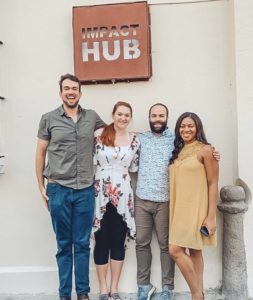
Impact Hub Team
Impact Hub is one of the world’s largest networks focused on building entrepreneurial communities for impact at scale — home to the innovators, the dreamers, and the entrepreneurs who are creating tangible solutions to the world’s most pressing issues. The Impact Hub Project Pyramid team was tasked with working with the Nashville Department of Economic and Community Development to come up with a plan to engage the economically disenfranchised population of Nashville, and to facilitate a business co-working space and support services for this community.
We made the trip to Antigua, Guatemala, to engage Impact Hub Antigua, which the TFC has a strong relationship with, to build a use case around an extremely successful model with a vision similar to the one we have for Nashville. We visited several other organizations but derived the most impactful learning from working through ideas with leaders from Impact Hub Antigua and Pomona Impact, a social venture capital fund tightly connected with Impact Hub Antigua.
Going forward, we worked to identify who our unique beneficiaries are, where they are located in Nashville, and what they truly need to climb the economic pyramid. This helped us shape the business plan to pitch to the City of Nashville and to build excitement around the idea in the city. Though this project will be a long-term initiative, our time in Guatemala provided the clarity we needed as a team to effectively move through remaining challenges and deliver the best possible solution to the City of Nashville.
Soles4Souls
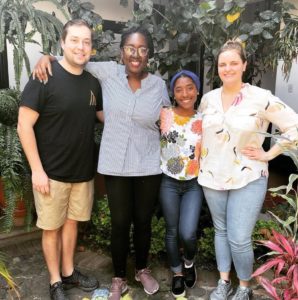
Souls4SolesTeam
The Soles4Souls teams worked with a Nashville-based nonprofit that works to turn unwanted shoes and clothing into opportunity, by keeping them from going to waste and instead putting them to good use. This model provides relief, creates jobs, and empowers people to break the cycle of poverty. Upon arriving in Guatemala, we threw ourselves into both enjoying Antigua and learning as much as possible to help us with our impact measurement project.
The first day, we met a former consultant who specialized in impact measurement. Throughout the rest of the week, we had many more meetings — some that were specifically relevant to our project, and some that helped us understand the context in Guatemala and micro-entrepreneurship more greatly. Through our meetings, we recognized common threads running through the information they were getting from each person. We ended the week with a meeting with in-country partner, Salome, allowing them to tie together their learnings about what Soles4Souls does in Guatemala, and even more broadly, in other countries.
Hanes Consulting
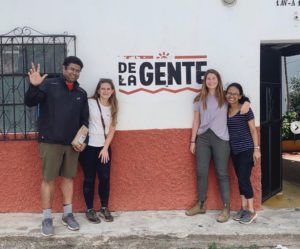
Hanes ConsultingTeam
The Hanes Green Coffee Consulting Group headed down to Guatemala to explore the coffee landscape and explore corporate social responsibility efforts. Since our is client based in Nashville, we used the spring break time to fact find and gain a better understanding of the Guatemalan coffee industry. We brought perspectives from our Masters’ programs in Economics, Business Administration, Marketing and Leadership & Organizational Performance to analyze our experiences in the country.
We spent the majority of our time exploring various coffee businesses and cooperatives, from a large, privately owned coffee plantation called Finca Filadelphia to De La Gente Coffee, a non-profit that supports coffee cooperatives. We learned about the lives of the coffee farmers, seasonal pickers, and coffee roasters. With the help of our translator, Moises, we were able to ask De La Gente members about the struggles and triumphs in coffee. We also traveled to Guatemala City and met with stakeholders at Le Central Coffee Roasters and Primavera Coffee Importers. Speaking with the founder and a master cupper, we were able to dive deeper into what premium coffee means and how business is done in the coffee industry.
Primeros Pasos
Primeros Pasos is a non-profit that seeks to improve the quality of life of rural communities in Guatemala through integrated health education programs and access to medical service. Our team was tasked with exploring the feasibility of the clinic implementing a Chronic Care Follow-Up Program. Our team conducted some cross-market analysis, and as the pandemic continued to unfold, was also investigated of the implications of COVID-19 on populations in the region in which Primeros Pasos operates.
Mexico (all in Mexico City)
MassChallenge
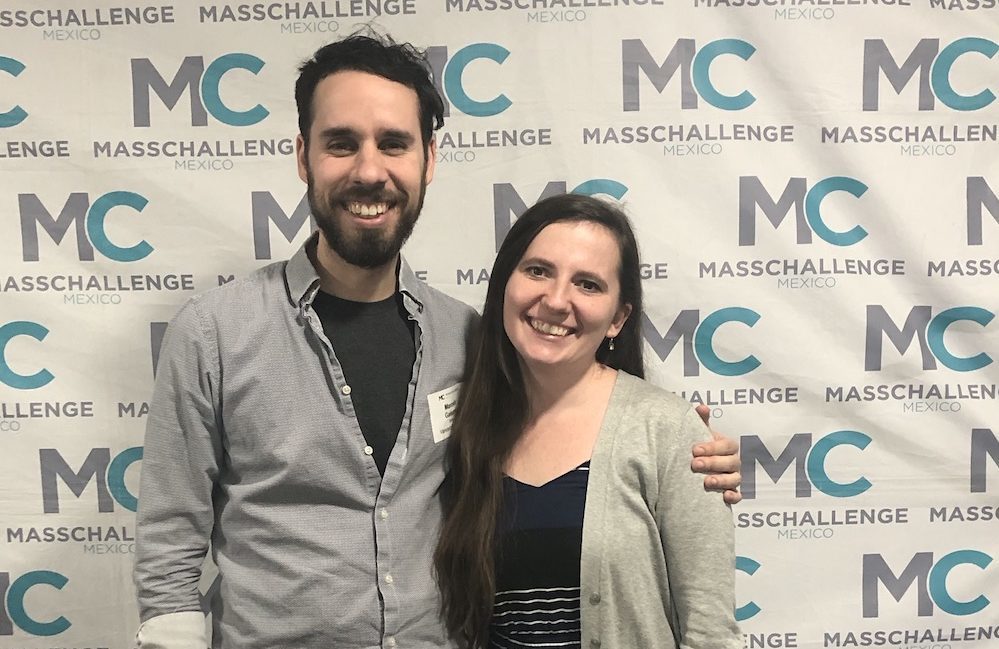
MassChallenge Team
Headquartered in the United States with locations in Boston, Israel, Mexico, Rhode Island, Switzerland, and Texas, MassChallenge strengthens the global innovation ecosystem by accelerating high-potential startups across all industries, anywhere in the world — for zero-equity taken. Our MassChallenge Project Pyramid team worked to develop a needs assessment tool for the startups that hope going to work with MassChallenge Mexico. The tool will hopefully facilitate more efficient intake and help MassChallenge get all the information that it needs upfront from the businesses that it works with.
Abeja Reyna
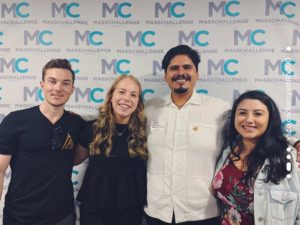
Abeja Reyna Team
Consisting of a Nursing Midwifery student, HR-focused MBA student, a Humphrey’s Educational Fellow, a Divinity student, and a dual Masters of Public Health and Latin American studies student, our Project Pyramid team set off to Mexico City to work with a MassChallenge winner, Abeja Reyna. Abeja Reyna is an organic beauty line supporting bees and Mexican beekeepers and our project work focused on growth opportunities and marketing strategy for the company. While in Mexico, our team learned about the company’s rich story and expansion since winning MassChallenge. We spent the week conducting market research, collaborating with the Mexico City-based Abeja Reyna team, exploring Mexico City’s vibrant culture, history, and food.
Nigeria
Aspire
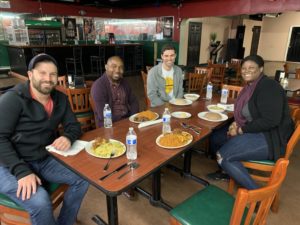
Aspire Team
Despite not having the opportunity to work alongside Rotimi and the Aspire team in Lagos, Nigeria, during spring break, we were able to modify our project and deliverables to support their company. Aspire is developing a Distributed Energy Utility that integrates clean energy solutions such as Solar with intermittent but affordable grid electricity to form Nanogrids and Microgrids that provide Africans starting in Nigeria, cleaner, more affordable and healthier on demand power. Our primary focus has been to craft an informational trifold/brochure that would provide an overview of their initiative, the “Installer Collective.” The Installer Collective will serve a community effort to educate the greater public about sustainable energy and why using new diesel energy generators can provide a plethora of environmental and health benefits. Our task was to ensure the information provided could be used to attract community organizers and interested individuals as well as potential investors.